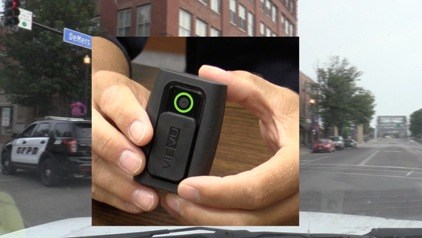LegitSlater: Why Did Grand Forks Police Buy Body Cams Before They Knew How They Would Be Used?

In late July, the Grand Forks City Council approved the purchase of digital video cameras for their police officers to wear as part of their uniforms, based on a request of that department.
“When they say a pictures worth 1000 words, a video is worth about 10,000 words so that’s why we’re implementing it, we’re hoping it’s going to be a benefit to the public, certainly going to help us collect the facts on scene,” said Grand Forks Police Department Lt. Dwight Love.
Lt. Love says the cameras should be a deterrent for belligerent behavior.
“The time that we’ve experimented with these that when you tell somebody hey you’re being videotaped, you’re behavior becomes a lot better,” said Lt. Love.
Seems like a neat idea — something they should have done already right? Well, it became a neat idea worth actually acting on with the help of a $40,000 federal grant. Nothing like a little “free” federal money burning a hole in your pocket to help put things in motion, and get your city council to buy off on the idea without too much thought. Most local government councils in this state can’t vote Yea fast enough on motions to spend federal money.
This past week, Valley News Live filed the below follow-up report on the body cameras, including some rather concerning remarks by the Grand Forks PD on their fielding:
What Lt. Love states above about behavior being better when a camera is present during times of police contact with a citizen also works both ways — cams can also help better ensure the cops are less likely to “misbehave” and violate the civil liberties of those they are there to serve. Of course, they need to be turned on to do that. Admittedly, a policy is still forthcoming on the use of the cams, but it appears that the on/off switch will be at the whim of the officer wearing it:
This fall, all Grand Forks police officers will start wearing these body cameras, which can be switched on and off at the officer’s discretion….
I’ll be the first to say that there are many times the cams should probably be off, or at least not recording. Those times are probably another great civil liberties discussion, but I think we can agree that they should not be recording randomly, with the files being archived in a manner where they can be used to reconstruct (at least without a warrant) the random comings and goings of just anyone/ any license plate/ etc. which happened to be inside the viewfinder of the camera. There needs to be rules on both the storage and disposal of the files. Extra care must also be taken when dealing with kids. Rules for release of body cam video based on an open records request by the media or a citizen needs to be hammered out; to include what can legally be held back or redacted. In short, there are many things that must be considered and put into policy, and the Grand Forks Police Department did acknowledge the need for a policy for the use of these cams.
Such a policy isn’t something that can only be developed by the police with the input of a city attorney. Since the body cams are new and hold tremendous potential to both enhance the service police provide our citizens, as well as violate their civil liberties, there needs to be thoughtful discussion with and input from those citizens as well. That could come via a public input process, but should definitely include the input of those elected to represent that public — the city council.
Yes, the same city council who granted their blessing to purchase the cameras using that free federal money. It seems to me the time to have had that discussion (hopefully with a public input session) would have been when the police department approached them for permission to use the grant. Appropriate questions would have focused on wanting to see the policy the department planned to follow for use of the cameras. And absent of this policy, the appropriate question from the counsel would have been why don’t you have one drafted, you know, before you buy the cameras to begin with?
I do have concerns with the use of body cameras by law enforcement, but also think they can have a place if the right policy is in place for their use — and that policy has diverse input. In the end, a body camera holds the same potential to both protect our officers while they do their job of protecting the public, or to be misused by those officers against the same public; no different from a nightstick or their duty weapon (things which have very defined policies for their use).
Absent an approved policy, it makes no sense to be expending taxpayer money on any piece of equipment (especially one like this which holds a potential for misuse). Part of the discussion in the development of this policy could have drawn the conclusion that using them to begin with may not be in the best interest of the police department, or the public they serve. Thus, the biggest concern is why were these cameras even bought to begin with, before the discussions happened on the right and wrong use of them, before serious discussion occurred on if buying them to begin with was the right thing for Grand Forks, and if so — before a policy was approved?
Oh yeah, I forgot. Because they had a chance to spend some free federal money, so it’s all ok. Nothing to see here.




